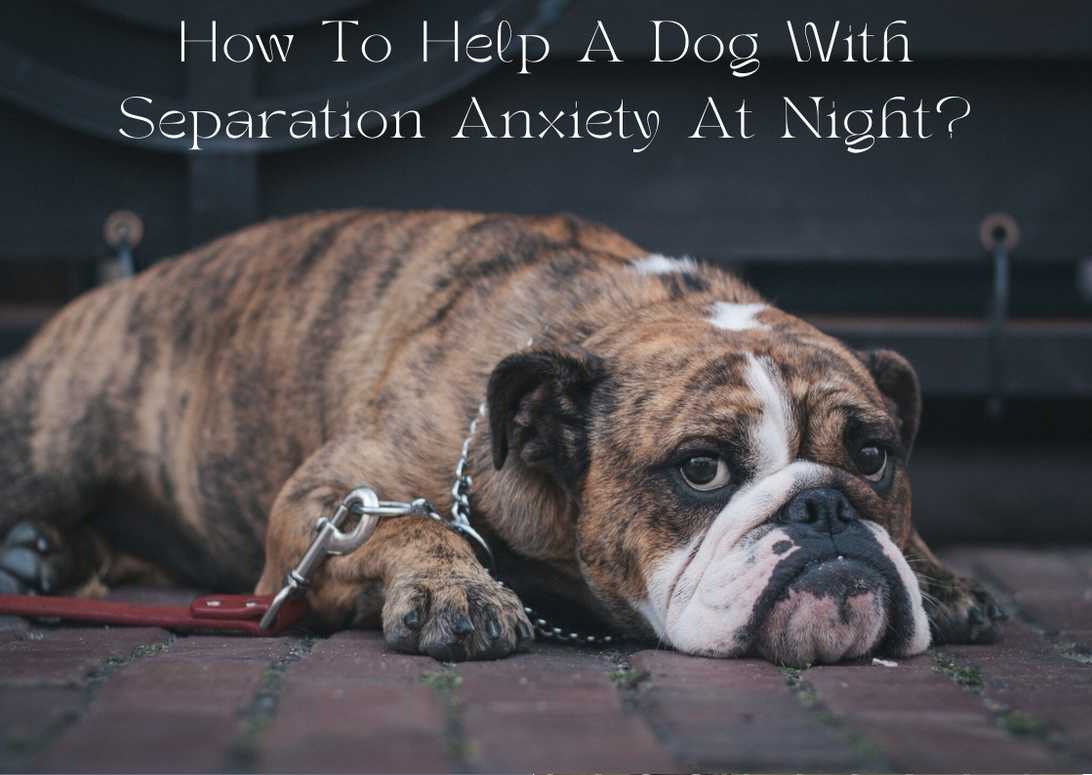How To Help A Dog With Separation Anxiety At Night?
Hey there, fellow dog owners! If you’re like me, dealing with a pup who has separation anxiety can be quite the challenge, especially when it comes to nighttime routines.
But fear not, because I’m here to share some strategies that have helped me and my furry companion find a sense of calm during those restless nights.
One effective approach I’ve found is gradually moving your dog’s sleeping area further away from your bed. This allows them to become more comfortable with being alone and reduces their reliance on constant proximity.
And if you’re looking for additional ways to promote relaxation, certain scents like vanilla, coconut, valerian, and ginger have been proven to reduce signs of stress and even aid in promoting better sleep for dogs.
So let’s dive into practical tips and techniques that will help both you and your four-legged friend get a peaceful and restful night’s sleep.
Important Points
- Gradually moving the dog’s sleeping area away from the owner’s bed
- Using scents like vanilla, coconut, valerian, and ginger to reduce stress and promote better sleep
- Creating a calm and cozy sleep environment with familiar bedding, soothing sounds, and a dark and quiet room
- Seeking professional help from an animal behaviorist or veterinarian for personalized treatment plans and possible medication in severe cases
Tips for a Calmer Night
To have a calmer night with your anxious pup, start by gradually moving their sleeping spot away from your bed. Try using calming scents like vanilla or coconut to help them relax and sleep better.
Begin by placing their crate or bed on the floor next to your bed, so they can still feel close to you. Then, over time, move it further away from your bed each night until it’s in the location you want it to be.
Additionally, incorporating soothing music can be helpful in creating a peaceful environment for your dog at night. Play soft, gentle melodies to drown out any outside noises that may trigger their anxiety.
Aromatherapy techniques can also be effective in promoting relaxation. Use essential oils such as lavender or chamomile in a diffuser or spray form near their sleeping area. These scents have calming properties that can soothe your dog’s nerves and help them feel more at ease during the night.
Another option is to provide comforting toys for your pup to cuddle with while they sleep. Some dogs find comfort in having something soft and snuggly to hold onto, which can alleviate feelings of separation anxiety.
In addition to these methods, consider using calming pheromone sprays specifically designed for dogs with anxiety issues. These sprays mimic natural pheromones produced by mother dogs to calm their puppies. Spray these pheromones near their sleeping area to create a sense of security and reassurance for your furry friend.
Lastly, relaxation exercises such as deep breathing or massage therapy can also aid in reducing anxiety levels before bedtime. Take a few minutes each evening to engage in these activities with your dog, helping them unwind and prepare for a restful night’s sleep.
By implementing these tips and techniques into your nighttime routine, you can create a comforting environment that promotes relaxation for your dog without causing further distress or discomfort.
Creating a Comforting Environment
Creating a cozy atmosphere can make it easier for your furry friend to settle down and feel secure during the nighttime. Here are some tips to help you create that comforting environment:
- Creating a cozy space: Designate a specific area for your dog’s nighttime rest, whether it’s in their crate, on a comfortable bed, or even just a designated corner of the room. This will give them a sense of belonging and security.
- Using calming scents: Certain scents like vanilla, coconut, valerian, and ginger can have a soothing effect on dogs. Consider using these scents in the form of essential oils or sprays around their sleeping area to promote relaxation.
- Providing soft and familiar bedding: Dogs love having their own special spot with soft bedding that they can snuggle into. Make sure to provide them with blankets or pillows that smell like you or have their scent on them.
Incorporating soothing sounds such as calming music or white noise machines can also help create a peaceful environment for your pup. Additionally, ensuring that the room is dark and quiet will minimize distractions and help your dog feel more at ease. By creating this comforting atmosphere, you’re setting the stage for better sleep and reduced anxiety for your furry companion.
Now let’s move on to natural remedies that can further aid in alleviating separation anxiety at night without causing any harm to your beloved pet.
Natural Remedies
Imagine finding a simple solution that can bring peace and tranquility to your restless companion during those long, dark hours. Essential oils, herbal supplements, aromatherapy techniques, calming music, and relaxation exercises are all natural remedies that can help alleviate separation anxiety in dogs at night.
Essential oils like vanilla and coconut have been shown to reduce signs of stress in dogs, and ginger has even been found to promote better sleep. By using a diffuser or applying a small amount of these oils on your dog’s bedding, you can create a soothing environment that promotes relaxation.
Herbal supplements such as valerian can also be effective in calming anxious dogs. Valerian has sedative properties that help promote relaxation and reduce anxiety levels. Aromatherapy techniques involving the use of essential oils can further enhance the calming effect on your dog. You can try diffusing lavender or chamomile essential oil in the room where your dog sleeps to create a peaceful atmosphere.
In addition to these natural remedies, other methods such as playing soft calming music or engaging in relaxation exercises with your dog before bedtime can help ease their anxiety. The gentle melodies of classical music or specially designed relaxing tracks for dogs can have a soothing effect on their nervous system. Relaxation exercises like massage or gentle stretching can also help them unwind before bed.
By incorporating these natural remedies into your nighttime routine, you can provide comfort and support for your dog with separation anxiety. These techniques will set the stage for gradual transitioning without causing undue stress or discomfort for your furry friend.
Gradual Transitioning
By incorporating these natural remedies, you can slowly transition your restless companion to a more peaceful sleep routine. Here are some techniques that can help ease your dog’s separation anxiety at night:
- Crate training: Introduce your dog to their crate during the day and make it a positive space by placing treats or toys inside. Gradually increase the amount of time they spend in the crate until they feel comfortable sleeping in it at night.
- Nighttime soothing techniques: Create a calming environment by dimming the lights and playing soft music or white noise. This can help soothe your dog and provide a sense of security.
- Using pheromone diffusers: Pheromone diffusers release synthetic versions of natural calming pheromones that can help reduce anxiety in dogs. Place them near your dog’s sleeping area for maximum effect.
- Incorporating calming music: Some dogs find classical music or specially designed relaxation tracks soothing. Experiment with different types of music to see what works best for your furry friend.
- Implementing positive reinforcement techniques: Reward your dog with treats, praise, and attention when they display calm behavior during bedtime routines. This will reinforce positive associations with nighttime and help alleviate anxiety.
With these techniques, you can gradually transition your dog to a more relaxed sleep routine. However, establishing a consistent bedtime routine is also crucial in helping them feel secure and comfortable at night.
Establishing a Bedtime Routine
Establishing a consistent nighttime routine is essential for ensuring your furry companion feels secure and comfortable during their slumber. Relaxation techniques, such as gentle massages or soothing music, can help calm their nerves and prepare them for a peaceful sleep.
Consistency and repetition are key in creating a sense of predictability for your dog, so try to stick to the same bedtime each night and follow a similar sequence of activities leading up to it. This could include taking them out for a final potty break, providing them with a special chew toy or treat, and dimming the lights in the room to create a relaxing atmosphere.
Bedtime cues can also be helpful in signaling to your dog that it’s time to wind down. You can use specific phrases like “bedtime”or “time for sleep”while engaging in these calming activities. Additionally, incorporating sleep aids like lavender-scented products or cozy blankets can further enhance their relaxation experience.
It’s important to remember that positive reinforcement plays a crucial role in reinforcing desired behaviors. Praise and reward your dog when they exhibit calm behavior during their bedtime routine, as this will encourage them to associate nighttime with feelings of security and comfort.
As you establish this bedtime routine, keep in mind that some dogs may require additional support beyond what can be achieved through these methods alone. If your furry friend continues to struggle with separation anxiety at night despite your efforts, it may be beneficial to seek professional help from a qualified animal behaviorist or veterinarian who specializes in anxiety disorders. Remember that every dog is unique, and finding the right approach may take time and patience.
In order to address this issue effectively without causing undue stress on yourself or your beloved pet, seeking professional help is an important next step. A professional veterinarian who specializes in anxiety disorders can assess your dog’s specific needs and develop a personalized treatment plan that may include behavior modification techniques, medication if necessary, and ongoing support and guidance. Seeking professional help will ensure that you receive expert advice and guidance tailored to your dog’s individual needs, ultimately helping your dog overcome their anxiety and lead a happier, more comfortable life.
Seeking Professional Help
If you feel like you’re stuck in the dark, unsure how to ease your furry companion’s worries at bedtime, a guiding light in the form of a professional veterinarian specializing in anxiety disorders can illuminate the path towards a peaceful slumber. Seeking professional help is crucial when dealing with separation anxiety at night, as they have the knowledge and expertise to provide effective solutions.
Here are some key points to consider:
- Importance of early intervention: Addressing separation anxiety early on can prevent it from worsening over time. A professional can assess your dog’s condition and develop a tailored plan to alleviate their distress.
- Types of professionals to seek help from: Look for veterinarians who specialize in behavior or anxiety disorders. They have specific training and experience in understanding and treating separation anxiety.
- Benefits of behavior modification therapy: Behavior modification techniques, such as desensitization and counterconditioning, can be highly effective in reducing separation anxiety symptoms. A professional can guide you through these methods and ensure proper implementation.
- Medication options for severe cases: In severe cases where behavior modification alone may not be sufficient, medication prescribed by a veterinarian can help manage your dog’s anxiety. They will carefully evaluate your dog’s needs and recommend appropriate medications if necessary.
- Balancing independence and dependence: A professional can assist you in finding the right balance between fostering independence and addressing your dog’s need for comfort. This includes creating a safe space for them while gradually teaching them to adapt to being alone.
By seeking assistance from a veterinarian specialized in anxiety disorders, you’ll gain valuable insights into effectively managing your dog’s separation anxiety at night. With their guidance, you’ll be able to create strategies that promote relaxation and comfort during bedtime routines. Transitioning into the next section about ‘monitoring and adjusting’ allows for continued progress towards overcoming this challenge without skipping a beat.
Monitoring and Adjusting
As I navigate through the process of addressing my furry companion’s nighttime worries, it’s essential to keep a close eye on their behavior and make necessary adjustments along the way. One important aspect is observing their behavioral cues. Dogs with separation anxiety may exhibit signs of distress such as excessive barking, pacing, or destructive behavior. By monitoring these cues, I can better understand the level of anxiety my dog experiences at night and take appropriate steps to help them feel more comfortable.
Tracking progress is another crucial component in assisting my dog with separation anxiety at night. It’s essential to document any changes in their behavior or sleep patterns over time. This allows me to see if the strategies I’m implementing are effective and whether there’s been an improvement in their overall well-being. By keeping a record of their progress, I can also identify any potential triggers that may be causing increased anxiety during the night.
In addition to monitoring and tracking progress, adjusting the sleep environment can greatly impact my dog’s comfort level. Creating a calming atmosphere by using soothing scents like vanilla or coconut can help reduce anxiety levels. Making sure their sleeping area is cozy and secure, with familiar objects nearby, provides a sense of security for them during the night. If necessary, I can also consider using products such as anti-anxiety wraps or pheromone diffusers specifically designed to alleviate stress in dogs.
Overall, by paying attention to behavioral cues, tracking progress, identifying triggers, and adjusting the sleep environment accordingly, I can provide my dog with the support they need to overcome separation anxiety at night.
Frequently Asked Questions
Can I use essential oils to help my dog with separation anxiety at night?
Yes, using essential oils for separation anxiety in dogs can be effective. However, there are potential risks involved, so it’s important to consult a veterinarian before using them. There are also alternative natural remedies available for dog separation anxiety.
Is it okay to give my dog a treat or toy to help them feel more comfortable when I leave?
Giving your dog a treat or toy can help them feel more comfortable when you leave. Crate training techniques, calming music, and training exercises can also reduce separation anxiety. Creating a safe environment is important, but severe cases may require professional help.
Should I avoid making a big fuss when leaving or returning home to prevent reinforcing my dog’s anxiety?
I should avoid making a big fuss when leaving or returning home to prevent reinforcing my dog’s anxiety. Instead, I can use positive reinforcement techniques, create a safe and comfortable space, establish a routine, and consider seeking professional help or advice for gradual desensitization methods.
How long does it typically take for a dog with separation anxiety to adjust to sleeping in a new location?
It varies for each dog with separation anxiety. The adjustment timeline can range from a few days to several weeks or even months. Creating a safe space, using training techniques, and seeking professional help can all help in the process. Potential underlying causes should also be considered.
Are there any specific breeds that are more prone to developing separation anxiety?
Specific breeds, such as Labrador Retrievers and German Shepherds, are more prone to developing separation anxiety due to genetic factors. While training techniques and managing anxiety triggers can help, seeking professional help is often necessary for effective treatment.
Conclusion
In conclusion, helping a dog with separation anxiety at night requires patience, consistency, and understanding. By implementing the tips and techniques discussed in this article, you can create a calmer nighttime routine for your furry friend.
Gradually transitioning their sleeping area further away from your bed allows them to feel more comfortable being alone, while incorporating scents like vanilla and ginger can promote a sense of relaxation.
Establishing a consistent bedtime routine helps to establish a sense of security and predictability for your dog. If necessary, don’t hesitate to seek professional help from a veterinarian or animal behaviorist who can provide additional guidance tailored to your dog’s specific needs.
Remember that addressing separation anxiety takes time and effort, just like building trust in any relationship. It’s important to monitor your dog’s progress and adjust strategies as needed.
With dedication and love, you can help your furry companion overcome their nighttime anxieties and find peace during those quiet hours. So take the first step on this journey towards tranquility with your four-legged friend; let them know that even in the darkness of night, they’re not alone but surrounded by care and understanding like the moonlit sky embracing the earth below.








